- Home
- Julia London
Wild Wicked Scot Page 2
Wild Wicked Scot Read online
Page 2
His voice had a deep, lilting brogue that was quite unexpected and tingled at the base of her skull.
“And how do you do?” he asked, taking her hand in his. It was huge, and his thumb felt calloused as he stroked it across her knuckles. Margot thought of Mr. Fitzgerald—with his long, slender and manicured fingers. Mr. Fitzgerald had the hands of an artist. This man had bear paws.
“I am well, thank you,” she said, and lightly pulled her hand away. She looked expectantly at her father. He seemed in no hurry to dismiss her now that he’d introduced her to these men. How long was she to remain here? She thought of Mr. Fitzgerald standing in the ballroom just now, with two flutes of French champagne in his hands. She could imagine any number of young ladies who were closing in around him, ready to cart him off like so many buzzards.
“Mackenzie is to receive a barony,” her father said. “He shall be Lord Mackenzie of Balhaire.”
Why on earth should she care about that? But Margot was ever the dutiful daughter and smiled at the man’s throat. “You must be pleased.”
The man tilted his head to one side to catch her eye before he responded. “Aye, that I am,” he said, and his gaze moved boldly to her mouth. “I verra much doubt you will understand just how pleased I am, Miss Armstrong.”
A strong shiver ran down Margot’s spine. Why did he look at her like that? He was so brazen, so unguarded! And her father, standing just there!
“Thank you, Margot,” her father said from somewhere near her—she wasn’t really sure where he was, as she couldn’t seem to tear her eyes away from this beast of a man just yet. “You may return to your friends.”
What was this? She felt like the prize county sheep, paraded in for viewing. Look at the fine wool on this one. It vexed her—there were times her father seemed to forget that she was not a bauble to be held up for admiration.
She stared steadily into those icy blue eyes and said, “It is a pleasure to have made your acquaintance.” It was not a pleasure at all—it was a nuisance—and she hoped the man could see it in her gaze. Well, if he couldn’t see it, his companions certainly could. They’d all stopped eating and were staring at her almost as if they’d never seen a woman before. Which, judging by their clothing and wretched table manners, was almost believable.
“Thank you, Miss Armstrong,” he said, that voice so deeply lilting that it felt like a feather stroking down her spine. “But the pleasure has been completely mine, aye?” He smiled.
Those words and that smile made Margot feel strangely warm and fluid. She hurried out, eager to be as far from those men as she could.
By the time she reached the ballroom, however, his name was forgotten, because Mr. Fitzgerald was dancing with Miss Remstock. Margot’s champagne was nowhere to be seen, and every other thought she had flew out of her head.
The next afternoon, her father informed her that he’d agreed to give her hand in marriage to that beast Mackenzie and then turned a deaf ear to her cries.
CHAPTER ONE
The Scottish Highlands
1710
UNDER A FULL Scottish moon on a balmy summer night, the air was so still that one could hear the distant sea as plainly as if one were standing in the cove below Castle Balhaire. The windows of the old castle keep were open to the cool night, and a breeze wafted through, carrying away with it the lingering smoke from the rush torches that lit the great hall.
The interior of the medieval castle had been transformed into a sumptuous space befitting a king—or at least a Scottish clan chieftain with a healthy sea trade. The clan chieftain, the Baron of Balhaire, Arran Mackenzie, was sprawled on the new furnishings of the great hall along with his men, with a fresh batch of ale and a small herd of lassies to occupy them.
At the top of the Balhaire watchtower, three guards passed the time tossing coins onto a cloak with each roll of the die. Seamus Bivens had already divested his old friend Donald Thane of two sgillin with his last roll. Two sgillin was not a fortune to a guard of Balhaire, thanks to Mackenzie’s generosity to those loyal to him, but nevertheless, when Seamus took two more sgillin, Donald felt the loss of his purse and his pride quite keenly. Heated words were exchanged, and the two men clambered to their feet, reaching for their respective muskets propped against the wall. Sweeney Mackenzie, the commander, was content to let the two men battle it out, but a noise reached him, and he leaped to his feet and stepped between them, holding them apart with his hands braced against their chests. “Uist!” he hissed to silence them. “Do ye no’ hear it?”
The two men paused and craned their necks, listening. The sound of an approaching carriage bounced between the ghostly shadows of the hills. “Who the devil?” Seamus muttered, and forgetting his anger with Donald, grabbed up the spyglass and leaned over the wall to have a look.
“Well?” Donald demanded, crowding in behind him. “Who is it, then? A Gordon, aye?”
Seamus shook his head. “No’ a Gordon.”
“A Munro, then,” said Sweeney. “I’ve heard they’ve been eyeing Mackenzie lands.” These were relatively peaceful times at Balhaire, but one should never have been surprised by a change in clan alliances.
“No’ a Munro,” Seamus said.
They could see the coach now, pulled by a team of four, accompanied by two riders in back and two guards alongside the coachman. The postilion held a lantern aloft on a pole to light their way, in addition to the light cast from the carriage lamps.
“Who in bloody hell comes at half past midnight?” Donald demanded.
Seamus suddenly gasped. He pulled the spyglass away from his eye and squinted at the coach, then just as quickly put it back to his eye and leaned forward. “No,” he said, his voice full of disbelief.
His two companions exchanged a look. “Who?” Donald demanded. “No’ Buchanan,” he said, his voice almost a whisper, referring to the Mackenzies’ most persistent enemy through the years.
“Worse,” Seamus said gravely, and slowly lowered the spyglass, his eyes gone round with horror.
“By God, say who it is before I bloody well beat it from you,” Sweeney swore, clearly unnerved.
“’Tis...’tis the Lady Mackenzie,” Seamus said, his voice barely above a whisper.
His two companions gasped. And then Sweeney whirled about, grabbed up his gun and hurried off to warn Mackenzie that his wife had returned to Balhaire.
Unfortunately, coming down from the tallest part of Balhaire was no easy feat, and by the time Sweeney had made his way into the bailey, the coach had come through the gates. The coach door swung open, and a step was put down. He saw a small but well-shod foot appear on that step, and he broke into a run.
* * *
ARRAN MACKENZIE ADORED the pleasant sensation of a woman’s soft bum on his lap, and the sweet scent of her hair in his nostrils, especially with the golden warmth of good ale lovingly wrapping its liquid arms around him. He’d sampled freely of the batch his cousin and first lieutenant had brewed. Jock Mackenzie fancied himself something of a master brewer.
Arran was slouched in his chair, his fingers slowly tracing a line up the woman’s back, lazily trying to recall her name. What is it, then—Aileen? Irene?
“Milord! Mackenzie!” someone shouted.
Arran bent his head to see around the blond curls of the woman in his lap. Sweeney Mackenzie, one of his best guards, was shouting at him from the rear of the hall. The poor man was clutching his chest as if his heart was failing him, and he looked quite frantic as he cast his gaze around the crowded room. “Wh-wh-where is he?” he demanded of a drunk beside him. “Wh-wh-where is Mackenzie?”
Sweeney was a fierce warrior and a dedicated commander. But when he was agitated, he had a tendency to stutter like he had when they were children. Generally there was little that could agitate the old salt, and that something had made Arran take noti
ce. “Here, Sweeney,” he said, and pushed the girl off his lap. He sat up, gestured his man forward. “What has rattled you, then?”
Sweeney hurried forward. “She’s b-b-b-back,” he breathlessly managed to get out.
Arran frowned, confused. “Pardon?”
“The L-L-L...” Sweeney’s lips and tongue seemed to stick together. He swallowed and tried to expel the word.
“Take a breath, lad,” Arran said, coming to his feet. “Steady now. Who has come?”
“L-L-L-Lady M-M-Mackenzie,” he managed.
That name seemed to drift up between Arran and Sweeney. Did Arran imagine it, or did everything in the hall suddenly go still? There was surely some mistake—he exchanged a look with Jock, who looked as mystified as Arran.
He turned to Sweeney again and said calmly, “Another breath, man. You’re mistaken—”
“He is not mistaken.”
Arran’s head snapped up at the sound of that familiar, crisply English, feminine voice. He squinted to the back of the hall, but the torches were smoking and cast shadows. He couldn’t make out anyone in particular—but the collective gasp of alarm that rose up from the two dozen or so souls gathered verified it for him: his wench of a wife had returned to Balhaire. After an absence of more than three years, she had inexplicably returned.
This undoubtedly would be viewed as a great occasion by half of his clan, a calamity by the other half. Arran himself could think of only three possible reasons his wife might be standing here now: one, her father had died and she had no place to go but to her lawful husband. Two, she’d run out of Arran’s money. Or three...she wanted to divorce him.
He dismissed the death of her father as a reason. If the man had died, he would have heard about it—he had a man in England to keep a close eye on his faithless wife.
The crowd parted as the auburn-haired beauty glided into the hall like a sleek galleon, two Englishmen dressed in fine woolen coats and powdered wigs trailing behind her.
She could not possibly have run out of money. He was quite generous with her. To a fault, Jock said. Perhaps that was true, but Arran would not have it said that he did not provide for his wife.
His wife’s grand entrance was suddenly halted by one of Arran’s old hunting dogs whose sight had nearly gone. Roy chose that moment to amble across the cleared path and plop himself down, his head between his paws on the cool stone floor, oblivious to the activity of humans around him. He sighed loudly, preparing to take his nap.
His wife daintily lifted her cloak and stepped over the beast. Her two escorts walked around the dog.
As she continued toward him, Arran had to consider that the third possibility was perhaps the most plausible. She had come to ask for a divorce, an annulment—whatever might give her freedom from him. And yet it seemed implausible she would have come all this way to ask it of him. Would she not have sent an agent? Or perhaps, he reasoned, as she made her way to the dais, she meant to humiliate him once more.
Margot Armstrong Mackenzie stood with her hands clasped before her and a faltering smile for the stunned, speechless souls around her. Her two escorts took up positions directly behind her, their gazes warily assessing the hall, their hands on the hilts of their small swords. Did they think they’d be forced to fight their way out? It was a possibility, for some of Arran’s people wore expressions of anticipation—far be it from any Scotsman to back away from anything that even remotely hinted at the potential for a brawl.
Not a death, then. Not a lack of funds. He had not ruled out divorce, but no matter what the reason, Arran was suddenly furious. How dare she return!
He leaped off the dais and strolled forward. “Has snow fallen on hell?” he asked calmly as he advanced on her.
She glanced around the hall. “I see no trace of snow,” she said as she removed her gloves.
“Did you come by sea? Or by broom?”
Someone on the dais chuckled. “By sea and by coach,” she said pleasantly, ignoring his barb. She cocked her head to one side and looked him over. “You look very well, my lord husband.”
Arran said nothing. He didn’t know what to say to her after three years and feared anything he did would unleash a torrent of emotion he was not willing to share with the world.
In his silence, Margot’s gaze wandered to her surroundings, to the rush torches, the iron chandeliers, the dogs wandering about the great hall. It was quite different from Norwood Park. She’d never cared for this massive great room, the heart of Balhaire for centuries now. She’d always wanted something finer; a fancy room, a London or Paris ballroom. But to Arran, this room was highly functional. There were two long tables where his clan sat, with massive hearths on either end of the hall to heat it. A few rugs on the floor muted the sound of boots on stone, and he’d always rather liked the flickering light of the torches.
“It’s still charmingly quaint,” she said, reading his thoughts. “Everything exactly the same.”
“No’ everything,” he reminded her. “I was no’ expecting you.”
“I know,” she said, wincing a bit. “And for that, I do apologize.”
He waited for more. An explanation. A begging of his forgiveness. But that was all she would say, apparently, as she was looking around him now, to the dais. “Oh, how lovely,” she said. “You have indeed added something new.”
He squinted over his shoulder. The dais was the only thing left of the original great hall besides the floors and the walls. It was a raised platform where the chieftain and his advisers had taken their meals over the years. The use of it was not so formal now, but still, Arran liked it—it gave him a view of the entire hall.
It took him a moment to realize she was admiring the carved table and upholstered chairs he’d acquired on a recent trade voyage, as well as the two silver candelabras that graced the head table. He’d taken those in payment from a man who was down on his luck and had needed some horses for a desperate run from authorities.
“It’s French, isn’t it?” she asked. “It looks very French.”
Was what French? And what did it matter at this moment, given the great occasion that was unfurling before them? Mr. and Mrs. Mackenzie of Balhaire were standing in the same room, and no knives had been drawn! Call the heralds! Trumpet the news! What the devil was his wife doing here after three years of silence, nattering on about his dining table? Why was she here without warning, without a word, particularly having left him in the manner she had?
Her audacity made him feel unstably angry; his heart was pounding uncomfortably in his chest. “I was no’ expecting you, and I’d like to know what has brought you to Balhaire, madam.”
“Aye!” someone said at the back of the hall.
“Goodness, I do beg your pardon.” She instantly sank into a very deep curtsy. “I was so taken by familiar surroundings that I failed to announce that I’ve come home.” She smiled beatifically and held out her hand for him to help her up.
“Home?” He snorted at the absurdity.
“Yes. Home. You are my husband. Therefore, this is my home.” She wiggled her fingers at him as if he’d forgotten her hand was extended to him.
Oh, he was aware of that hand, and more important, that smile, because it burned in Arran’s chest. It ended in a pair of dimples, and her luminescent green eyes sparkled with the low light of the hall. He could see the wisps of her auburn hair peeking out beneath the hood of her cloak, dark curls against her smooth, pale skin.
She kept smiling, kept her hand outstretched. “Will you not come and greet me?”
Arran hesitated. He was still dressed in his muddied riding clothes, his coat had gone missing from his body, his collar was open to his bare chest, and his long hair was tamed by only his fingers and harnessed in a rough queue down his back. Nor had he shaved in several days, and he no doubt reeked a bit. But he reached for her
hand and took it in his.
Such fine, delicate bones. He closed his calloused fingers around her fingers and yanked her to her feet with enough force that she was forced to hop forward. Now she stood so close that she had to tilt her head back on that swan-like neck to look him in the eye.
He glared at her, trying to understand.
She arched a single dark brow. “Welcome me home, my lord,” she said, and then, with a smile that flashed as wicked as the diabhal himself, she surprised him—shocked him, really—by rising up on her toes, wrapping an arm around his neck and tugging his head down to hers to kiss him.
Bloody hell, Margot kissed him. That was as surprising as her sudden appearance. And it was not a chaste kiss, either, which was the only sort of kiss he’d known from his young bride, timid and prudish, who’d left him three years ago. This was a full-bodied kiss, one that bore the markings of maturity, with succulent lips, a playful little tongue and teeth that grazed his bottom lip. And when she’d finished kissing him, she slipped back down to her toes and smiled at him, her green eyes shining with the light of the torches that lit the hall.
It was effective. A wee bit of Arran’s anger began to turn to desire as he took her in. She looked the same—perhaps a bit more robust—but this wasn’t the bride who had fled Balhaire in tears. Arran roughly pushed the hood of her cloak from her head. Her hair was rich auburn, and he touched the curling wisps around her face. He ignored the feathered arch of her brow as he unfastened the clasp of her cloak. It swung open, revealing the tight fit of her traveling gown, the creamy swell of her breasts above the gold brocade of her stomacher. He noticed something else, too—the emerald necklace he’d given her on the occasion of their wedding glimmered in the hollow of her throat. She looked ravishing. Seductive. She was a fine meal for a man to savor one bite at a time.
But she was grossly mistaken if she thought he would be dining at her table.
“It would seem my purse has found you often enough,” he said, admiring the quality of her silk gown. “And you look to be in excellent health.”

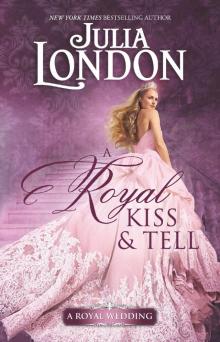 A Royal Kiss & Tell
A Royal Kiss & Tell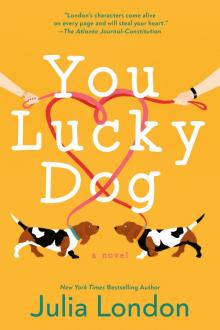 You Lucky Dog
You Lucky Dog The Devil in the Saddle
The Devil in the Saddle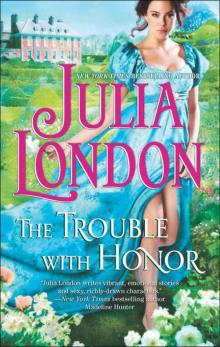 The Trouble with Honor
The Trouble with Honor Tempting the Laird
Tempting the Laird The Secret Lover
The Secret Lover A Light at Winter’s End
A Light at Winter’s End The Charmer in Chaps
The Charmer in Chaps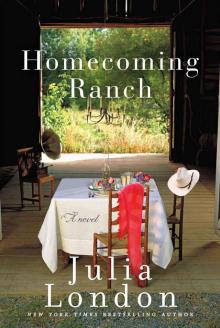 Homecoming Ranch
Homecoming Ranch Jack (7 Brides for 7 Soldiers Book 5)
Jack (7 Brides for 7 Soldiers Book 5)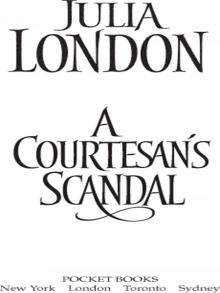 A Courtesan's Scandal
A Courtesan's Scandal Hard-Hearted Highlander--A Historical Romance Novel
Hard-Hearted Highlander--A Historical Romance Novel The Complete Novels of the Lear Sister Trilogy
The Complete Novels of the Lear Sister Trilogy The Last Debutante
The Last Debutante Suddenly Single (A Lake Haven Novel Book 4)
Suddenly Single (A Lake Haven Novel Book 4) Seduced by a Scot
Seduced by a Scot Highlander Unbound
Highlander Unbound Suddenly Dating (A Lake Haven Novel Book 2)
Suddenly Dating (A Lake Haven Novel Book 2)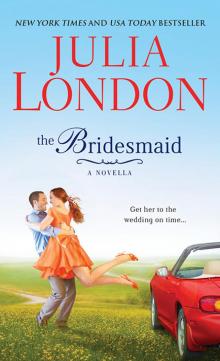 The Bridesmaid
The Bridesmaid The Seduction of Lady X
The Seduction of Lady X One Mad Night
One Mad Night Extreme Bachelor
Extreme Bachelor The Scoundrel and the Debutante
The Scoundrel and the Debutante The Revenge of Lord Eberlin
The Revenge of Lord Eberlin American Diva
American Diva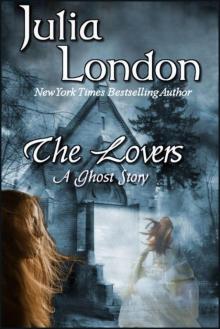 The Lovers: A Ghost Story
The Lovers: A Ghost Story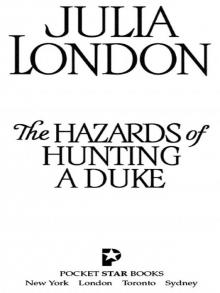 The Hazards of Hunting a Duke
The Hazards of Hunting a Duke Return to Homecoming Ranch (Pine River)
Return to Homecoming Ranch (Pine River)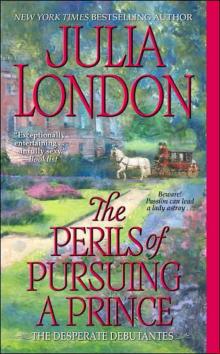 The Perils of Pursuing a Prince
The Perils of Pursuing a Prince Highlander in Love
Highlander in Love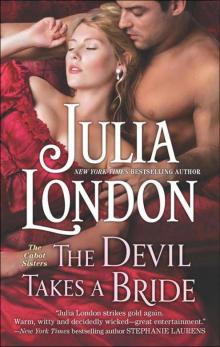 The Devil Takes a Bride
The Devil Takes a Bride Devil in Tartan
Devil in Tartan Wild Wicked Scot
Wild Wicked Scot Snowy Night with a Highlander
Snowy Night with a Highlander One Season of Sunshine
One Season of Sunshine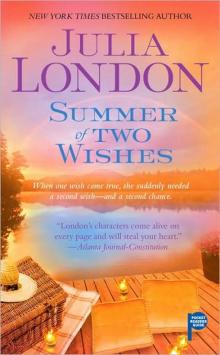 Summer of Two Wishes
Summer of Two Wishes All I Need Is You aka Wedding Survivor
All I Need Is You aka Wedding Survivor Sinful Scottish Laird--A Historical Romance Novel
Sinful Scottish Laird--A Historical Romance Novel Suddenly Engaged (A Lake Haven Novel Book 3)
Suddenly Engaged (A Lake Haven Novel Book 3) Highlander in Disguise
Highlander in Disguise Suddenly in Love (Lake Haven#1)
Suddenly in Love (Lake Haven#1)